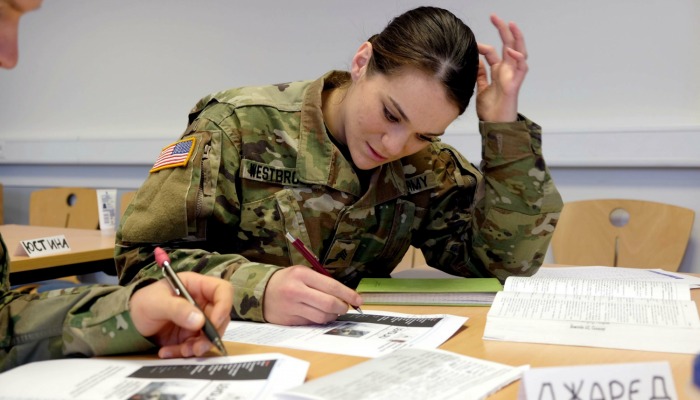The Armed Services Vocational Aptitude Battery, or the ASVAB, tests your knowledge of basic concepts and skills to date, and determines what branch and rank in the military you are eligible for. Generally, this is knowledge you would have acquired in high school. However, there are sections of the test that you may not have been specifically taught in class, but measure your knowledge of necessary skills for certain positions, such as mechanical comprehension.
You are given multiple scores–a standard score for each of the subtests, an AFQT score, and composite scores. So, what do all these scores mean? This article will walk you through each of these scores, what they mean, and how they’re calculated.
See also: ASVAB Test Prep: How to Get the Score You Want on the ASVAB
Standard Scores
Standard scores are given for each of the nine sections of the ASVAB. Here are the sections in order and their commonly referred to abbreviations:
- General Science (GS)
- Arithmetic Reasoning (AR)
- Word Knowledge (WK)
- Paragraph Comprehension (PC)
- Mathematics Knowledge (MK)
- Electronics Information (EI)
- Auto & Shop Information (AS)
- Mechanical Comprehension (MC)
- Assembling Objects (AO)
If you remember the words “mean” and “standard deviation” from your statistics class, you’re one step ahead. For those who don’t, the mean is the average of a set of numbers. The ASVAB subtests use a one to 100 score range, so the mean is set to 50. This is based on a national sample of 18 to 24-year-olds.
A standard deviation is a measurement of distance from the mean. The ASVAB standard deviation is set to 10. Therefore, if you receive a score of 60, you have scored one standard deviation above the mean. If you receive a score of 70, you have scored two standard deviations above the mean, and so on. So, your score isn’t the number of questions you answered correctly, but how many questions you answered correctly in comparison to others who have taken the test.
Your standard scores don’t determine anything specific on their own, but are used to calculate other scores that determine your eligibility, branch, and rank in the military.
AFQT Scores
Your AFQT score specifically determines if you are eligible for enlistment in the military. Each branch of the military has a different minimum AFQT score requirement, listed below:
- Air Force – 36
- Army – 31
- Minimum score of 50 to qualify for certain enlistment incentives
- Marine Corps – 32
- Navy – 35
- Coast Guard – 40
*Note that if you do not have a high school diploma but have passed the GED test, minimum score requirements may be higher. Check with your recruiter for more details on this in regards to your desired branch.
The AFQT score is calculated by combining the standard scores of four subject tests: Arithmetic Reasoning (AR), Mathematics Knowledge (MK), Paragraph Comprehension (PC), and Word Knowledge (WK). The scores are shown as percentiles, which is a similar concept to the standard score scoring method. The score you see is based on the number of questions you answered correctly compared to other test takers, and ranges from a percentile score of one to 99.
Composite Scores
Composite scores, also called line scores, help determine which military job is right for you, and some composite scores are required for certain jobs and branches. This is part of the classification process, which matches new recruits to specific jobs and branches they may perform well in. According to the official ASVAB website, “each service develops and validates its own set of composites based on the combination of subtests that are most highly correlated with on-the-job performance for clusters of occupations.”
To break this down, each branch of the military determines which skills are most important in the branch. Specific subtests are chosen to evaluate a candidate’s knowledge of these particular skills. A computational formula is applied that combines the standard scores of these chosen subtests. You will receive ten of these scores calculated from the computational formulas on your score report. Composite score categories, their acronyms, and formulas used to compute them are listed below:
- Clerical (CL) = Word Knowledge (WK) + Paragraph Comprehension (PC) + Arithmetic Reasoning (AR) + Mathematics Knowledge (MK)
- Combat (CO) = Word Knowledge (WK) + Paragraph Comprehension (PC) + Auto & Shop Information (AS) + Mechanical Comprehension (MC)
- Electronics (EL) = General Science (GS) + Arithmetic Reasoning (AR) + Mathematics Knowledge (MK) + Electronic Information (EI)
- Field Artillery (FA) = Arithmetic Reasoning (AR) + Mathematics Knowledge (MK) + Mechanical Comprehension (MC)
- General Maintenance (GM) = General Science (GS) + Auto & Shop Information (AS) + Mathematics Knowledge + Electronics Information
- General Technical (GT) = Word Knowledge (WK) + Paragraph Comprehension (PC) + Arithmetic Reasoning (AR)
- Mechanical Maintenance (MM) = Auto & Shop Information (AS) + Mechanical Comprehension (MC) + Electronic Information (EI)
- Operators and Food (OF) = Word Knowledge (WK) + Paragraph Comprehension (PC) + Auto & Shop Information (AS) + Mechanical Comprehension (MC)
- Surveillance and Communications (SC) = Word Knowledge (WK) + Paragraph Comprehension (PC) + Arithmetic Reasoning (AR) + Auto & Shop Information (AS) + Mechanical Comprehension (MC)
- Skilled Technical (ST) = Word Knowledge (WK) + Paragraph Comprehension (PC) + General Science (GS) + Mechanical Comprehension (MC) + Mathematics Knowledge (MK)
Understanding how your ASVAB scores are calculated will help you be strategic when studying, so you can focus on specific areas you want to do well in, and feel especially ready to tack the AFQT sections. Overall, knowing how your ASVAB scores apply to your potential enlistment, position, and rank will make the testing process much less confusing and more productive.
Want more help preparing for the ASVAB? Check out Peterson’s ASVAB test prep products.
Information sourced from official ASVAB scoring information documents, the official army recruitment website, and Peterson’s Master the ASVAB.



